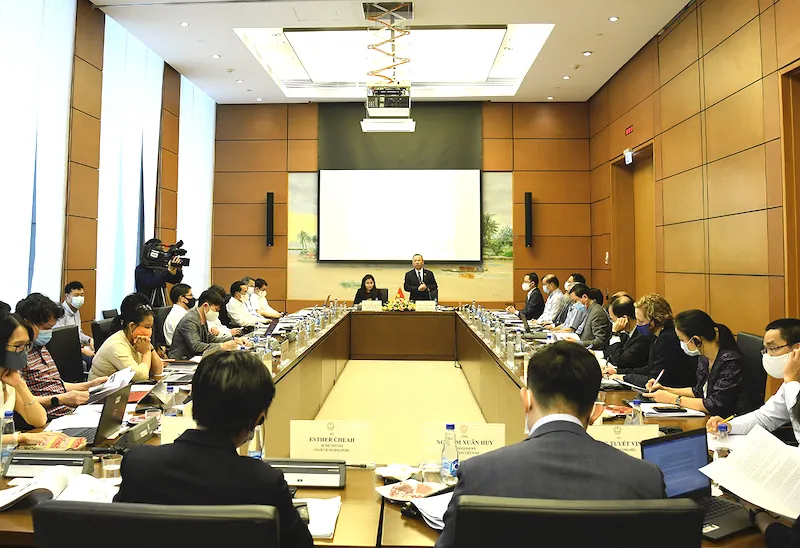Vietnam needs to perfect its legal framework for digital economy
Policies to support small and medium enterprises to join the process of digital transformation are necessary.
Vietnam needs to set a common standard and legal framework for digital transformation and digital economy to ensure a balance between promoting and creating a safe environment for users associated with data protection, diplomats recommended.
| An overview of the seminar is held in Hanoi. Photos: quochoi.vn |
Representatives of the embassies of Singapore, the US, South Korea, Thailand, and Japan shared their experiences and suggestions on digital transformation in response to the Covid-19 pandemic at a related talk held on September 28.
The delegates acknowledged Vietnam's efforts in approaching the trend of digital transformation and digital economy but said the country still faced limitations in promoting digital transformation and digital economy.
“In the process of building a legal framework for digital transformation, countries need to agree on cross-border data transfer, promote data circulation while ensuring data privacy and intellectual property,” the delegates noted.
In addition, they also said the digital economy cannot develop without the active participation of businesses and people. Therefore, the State should have policies to support small and medium enterprises to join the process.
From the view of the European businesses, Dang Tuyet Vinh, Advocacy Manager of the European Chamber of Commerce (EuroCham) in Vietnam said since the EU-Vietnam Free Trade Agreement (EVFTA) took effect from August 1, 2020, it is time to implement solutions to boost the digital economy. with the goal of maximizing the benefits of the deal and other trade agreements. "Digitization would help strengthen cross-border trade facilitation."
Vinh recommended that the Vietnamese Government develop and apply smart cloud policies to accelerate the digital transformation process. “The government should consider policies to support the transition to a secure digital environment such as accrediting digital signature certificates issued to individuals, promoting priority policies for the public cloud platform, and compliance and security in cloud computing as well as data classification.,”
To master the digital economy, Tran Thi Lan Huong from the World Bank (WB) in Vietnam gave some recommendations, including investing in people, institutions, and technology as well as taking advantage of cloud infrastructure for data storage and analysis.
| Tran Thi Lan Huong, senior governance advisor of the World Bank. |
Deputy Director of the Central Institute for Economic Management and Research Nguyen Hoa Cuong acknowledged that Vietnam's readiness for digitization is still limited. He pointed out barriers such as unsynchronized infrastructure, and low connectivity capacity as well as lack of regulations on user protection.
Supporting policies in the institutional system are not completely convenient to people and businesses while high-quality human resources are scarce in quantity and weak in quality. The private sector has not really innovated, Cuong added.
Vice Chairman of the National Assembly (NA)’s Committee for Foreign Affairs Nguyen Manh Tien stressed that the digital economy including digital finance and digital banking will be one of the leading and effective solutions to restore the world economy and Vietnam after the pandemic.
Vietnam is considered a potential market to develop digital banking and digital finance, with a size of nearly 97 million people, a mature population structure, in which the number of internet users has amounted to about 68 million people, accounting for about 70%.
Tien underlined the results of the seminar will be a valuable source of information and documents for the NA’s agencies and deputies to study and refer to during the implementation of digitalization and propose specific and clear solutions to the Government, ministries, sectors, and relevant agencies.
| Recently, the country has approved the National Technology Innovation Program up to 2030 to support enterprises in technology transfer and innovation for high quality and high value-added products. It sets the targets of increasing the number of enterprises implementing technology innovation by 15% per year; involving 100% of enterprises producing key products in the creation of research and development organizations by 2025. |











